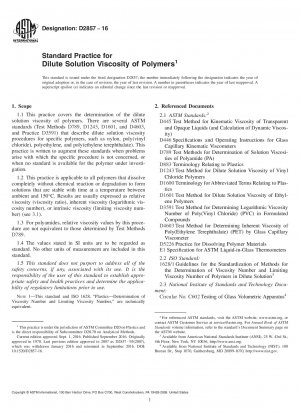ASTM D2857-16
Standard Practice for Dilute Solution Viscosity of Polymers
- Standard No.
- ASTM D2857-16
- Release Date
- 2016
- Published By
- American Society for Testing and Materials (ASTM)
- Status
- Replace By
- ASTM D2857-22
- Latest
- ASTM D2857-22
- Scope
5.1 The determination of dilute solution viscosity provides one item of information towards the molecular characterization of polymers. When viscosity data are used in conjunction with other molecular parameters, the properties of polymers depending on their molecular structure may be predicted.
5.2 Viscosity is dependent on molecular weight distribution, so with certain restrictions, satisfactory correlations can be obtained between dilute-solution viscosity and molecular parameters such as molecular weight or chain length. The most limiting restrictions that must be observed are as follows:
5.2.1 It must be known that the polymers used to establish the correlations and those to which they are applied do not consist of or contain branched species. Basically a measure of molecular size and not molecular weight, the dilute solution viscosity can be correlated appropriately with molecular weight or chain length only if there is a unique relationship between the mass and the size of the dissolved polymer molecules. This is the case for linear, but not for most branched, polymers.
5.2.2 For reasons similar to those outlined in 5.2.1, it must be required that the polymers to which the correlations are applied have the same chemical composition as those used in establishing the relationships.
5.3 For polymers meeting the restrictions of 5.2, empirical relationships can be developed between the dilute solution viscosity of a polymer and its hydrodynamic volume or average chain dimension (radius of gyration or end-to-end distance). Such relationships depend upon any variables influencing this molecular size of the dissolved polymer. The most important of these variables are solvent type and temperature. Thus, the solution viscosity of a given polymer specimen depends on the choice of these variables, and they must always be specified with the viscosity for complete identification.
5.4 The solution viscosity of a polymer of sufficiently high molecular weight may depend on rate of shear in the viscometer, and the viscosity of a polyelectrolyte (polymer containing ionizable chemical groupings) will depend on the composition and ionic strength of the solvent. Special precautions beyond the scope of this practice are required when measuring such polymers.
5.5 Finally, the viscosity of polymer solutions may be affected drastically by the presence of recognized or unrecognized additives in the sample, including but not limited to colorants, fillers, or low-molecular-weight species.
1.1 This practice covers the determination of the dilute solution viscosity of polymers. There are several ASTM standards (Test Methods D789, D1243, D1601, and D4603, and Practice D3591) that describe dilute solution viscosity procedures for specific polymers, such as nylon, poly(vinyl chloride), polyethylene, and poly(ethylene terephthalate). This practice is written to augment these standards when prob......
ASTM D2857-16 Referenced Document
- ASTM D1243 Standard Test Method for Dilute Solution Viscosity of Vinyl Chloride Polymers
- ASTM D1600 Standard Terminology for Abbreviated Terms Relating to Plastics
- ASTM D1601 Standard Test Method for Dilute Solution Viscosity of Ethylene Polymers
- ASTM D3591 Standard Test Method for Determining Logarithmic Viscosity Number of Poly(Vinyl Chloride) (PVC) in Formulated Compounds
- ASTM D445 Standard Test Method for Kinematic Viscosity of Transparent and Opaque Liquids (the Calculation of Dynamic Viscosity)
- ASTM D446 Standard Specifications and Operating Instructions for Glass Capillary Kinematic Viscometers
- ASTM D4603 Standard Test Method for Determining Inherent Viscosity of Poly(Ethylene Terephthalate) (PET) by Glass Capillary Viscometer
- ASTM D5226 Standard Practice for Dissolving Polymer Materials
- ASTM D789 Standard Test Methods for Determination of Relative Viscosity and Moisture Content of Polyamide (PA)
- ASTM D883 Standard Terminology Relating to Plastics
- ASTM E1 Standard Specification for ASTM Thermometers
ASTM D2857-16 history
- 2022 ASTM D2857-22 Standard Practice for Dilute Solution Viscosity of Polymers
- 2016 ASTM D2857-16 Standard Practice for Dilute Solution Viscosity of Polymers
- 1995 ASTM D2857-95(2007) Standard Practice for Dilute Solution Viscosity of Polymers
- 1995 ASTM D2857-95(2001) Standard Practice for Dilute Solution Viscosity of Polymers
- 1995 ASTM D2857-95 Standard Practice for Dilute Solution Viscosity of Polymers
- 1977 ASTM D2857-70(1977) Standard Test Method for Dilute Solution Viscosity Of Polymers

Copyright ©2024 All Rights Reserved